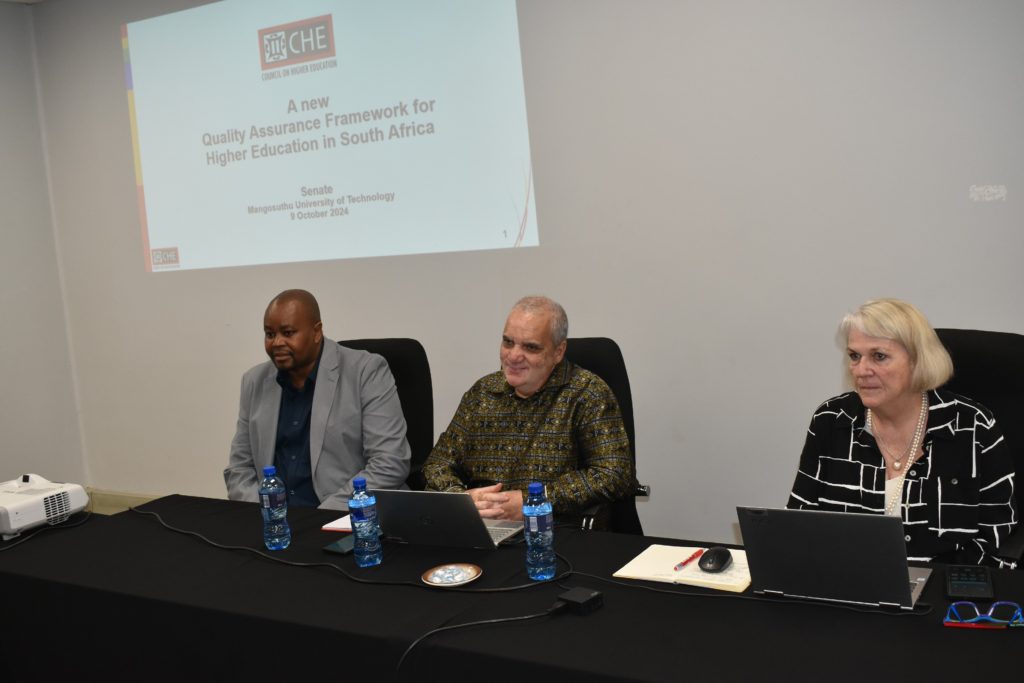
On 9 October 2024, the Council on Higher Education (CHE) honoured the commitment it made in April to visit the University to conduct a Quality Assurance Framework (QAF) workshop with Executive Management and the Senate of the University. The theme of the visit was ‘Preparing the University’ for the QAF.’ The MUT visit was part of the nationwide meetings, which covered the nature and purpose of the QAF and how it represents a significant change to the roles of institutions, particularly Senates and the CHE, in respect of promoting and assuring quality as well as providing an update on progress made to date with preparations for the implementation of the QAF from 2024; and identifying the capacity development needs that need to be addressed as CHE moves towards implementation of the QAF.
Dr Whitfield Green, CHE Chief Executive Officer (CEO), said the CHE approved the QAF as a strategic and philosophical driver of external quality assurance (EQA) in South Africa in September 2020. Dr. Green said they were rolling the programme out to ensure everything was done correctly. Dr Green emphasized the importance of proper consultation with all the higher education institutions to ensure that everyone got on board, as the aim was to see the higher education institutions driving Internal Quality Assurance (IQA). Dr Green said they knew a long road ahead and added that they would make themselves available for any help the higher education institutions would need. They would strengthen their department to meet the assignment’s demands and continue to assist the higher education institutions in improving their responsible divisions so the transfer from CHE to them would be successful.
The QAF aims to enable the CHE and the higher education sector to execute their quality assurance responsibilities in a manner responsive to a rapidly evolving education and training context. “The CHE has been preparing for its implementation, and it was formally launched on 19 September 2023. Several priority work areas have been identified as essential for the effective implementation of the QAF from 2024,” said Dr Green. He said these were being addressed through the QAF Implementation Preparation Project (QAF IPP), which has been underway for several years. Communities of Practice have been constituted to undertake significant development work over this period, he said, emphasizing the latter’s role in the process. “In this way, many peers from across the sector have been and will continue to be drawn to contribute their knowledge and expertise to implementing the QAF. Their efforts are greatly appreciated,” Dr Green said.
In his letter to MUT management, Dr. Green said, “Given the complexity and scale of the preparation and implementation challenges, it is important that the initiatives and processes being developed and refined are communicated widely and effectively.” His presentation to the MUT Senate was a demonstration of this point. Dr Green and his colleague, Dr Britta Zawada, Director of Institutional Audits and QAF Implementation Coordinator, were cautious and meticulous when making their presentations. They both emphasized the need for the change, how institutions of higher learning would benefit from the change, how the change would be driven, what it was about, and that it would not be a one-size-fits-all. It would rolled out on a need, strength, and weakness basis. Both CHE leaders said that the switch would take some time, with Dr Green saying that it was an institutional process, and there those divisions within the institution that are doing well would have to assist those that are struggling. Dr Green CHE would not allow an institution to introduce something new when problems still need to be addressed. Dr. Green shot down the silo mentality and said that one of the requirements for QAF succeeds was that departments in an institution have to work together.
The QAF is not a policing mechanism but a two-way process. Hence, its meetings are designed to elicit meaningful feedback from the University Management and Senates, which is crucial at this stage of implementing the QAF. The MUT Senate members responded well by asking questions and making suggestions. Dr Green appreciated a question from a Senate member to seek clarification on what would happen if the CHE needed to appeal a decision. He said that input from institutions would not be necessary only to disseminate and clarify QAF progress “but to ensure that sectoral feedback is obtained and incorporated.”
